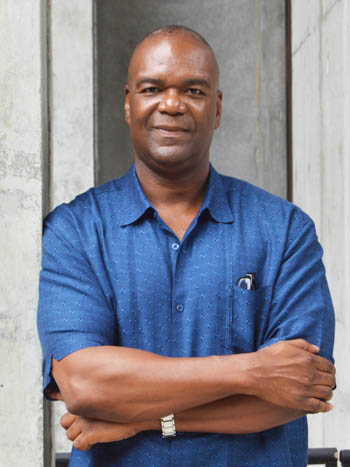Campus News
Uncovering the social factors lurking within diabetes risk
Assistant professor of sociology James Doucet-Battle’s new book challenges assumptions about race within diabetes research and delves into the issue through the lens of African American experience.

For assistant professor of sociology James Doucet-Battle, diabetes research is personal. His grandmother was diabetic, and that’s part of what inspired him to delve into the issue through the lens of African American experience.
“I’m interested in this notion that there is a racial component to risk for type 2 diabetes,” he said. “I wanted to unpack the ways in which African Americans—and, increasingly, Latino people—are held up as examples of high-risk type 2 diabetes populations.”
Diabetes is a medical condition that affects the body’s ability to regulate blood sugar levels, and in type 2 diabetes, cells become resistant to insulin, the hormone produced in the pancreas that normally helps cells convert blood sugar into energy. African American people are far more likely to develop type 2 diabetes than white Americans. But why? And what are the effects of this disparity?
These are some of the questions that Doucet-Battle wanted to explore. And now, his new book, Sweetness in the Blood: Race, Risk, and Type 2 Diabetes, captures findings from that journey in a way that challenges assumptions about race within diabetes research.
For the first phase of the project, Doucet-Battle studied how African American populations with diabetes interact with researchers, healthcare professionals, and diabetes technologies, like glucometers. In particular, he wanted to uncover how the history of racism in the United States has affected trust between African American communities and biomedical researchers.
Doucet-Battle also studied a Silicon Valley-based biotechnology company’s efforts to design a diabetes risk algorithm and examined how they navigated race in projecting health outcomes. The company had sought out an African American test group and a group of participants from Mauritius, in the Indian Ocean. It struck Doucet-Battle that both Mauritius and parts of the United States were once sugar colonies. That launched him into a study of how the global geography of diabetes reflects the history of colonialism and slavery.
He also worked with epidemiologists, molecular biologists, and genomicists across the country to look for diabetes risk factors in mitochondrial DNA, a maternally inherited chromosome that plays an important role in human metabolic adaptation to environmental change. Through this work—spurred by the 2013 mapping of the genome and epigenome of the maternally derived HeLa cells of Henrietta Lacks—he demonstrates the importance of analyzing gender before attempting to examine the social construct of race.
Ultimately, Doucet-Battle says researchers who want to better understand diabetes risk should focus more attention on social factors, because “risk is as socially, culturally, politically, and economically created as it is biologically.”
For example, he explained that type 2 diabetes is strongly associated with body weight, and many type 2 diabetics may be able to reduce or eliminate their dependence on medication through diet and exercise. Similarly, those who are prediabetic could reduce their risk of developing the disease. However, Doucet-Battle notes that “the cultural and economic impulses in this country are mitigating against that.” And one of those factors is inequality in access to physical activity.
“While we can stay relatively healthy here in Santa Cruz County walking up and down the verdant hills of the Central Coast, for a lot of people, getting that recommended 180 minutes of aerobic exercise per week is quite a challenge,” he said. “Particularly when you’re living in resource-deprived, unsafe, or aesthetically challenging areas.”
In his future research, Doucet-Battle wants to continue exploring how barriers to physical activity affect diabetes risk and treatment outcomes. He’s particularly interested in taking a regional look at how COVID-19 lockdowns and poor air quality during California’s 2020 wildfire season have affected the lives of diabetics. To study this, he’s assembling a team of UC Santa Cruz undergraduate researchers, with funding from the Building Belonging program administered by the Institute for Social Transformation.
Overall, when he looks back at the experience of writing Sweetness In The Blood, Doucet-Battle says it has helped him visualize the intersection of race, gender, history, and scientific knowledge production in new ways that will have a lasting effect on his approach to research.
“I came into this project as a medical anthropologist,” he said. “I came out of it as a social scientist of science.”